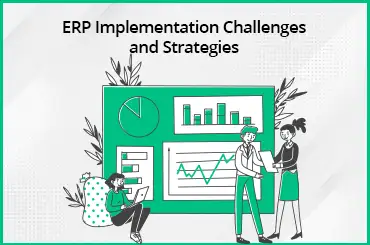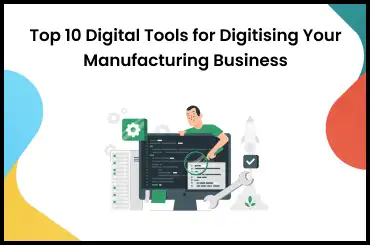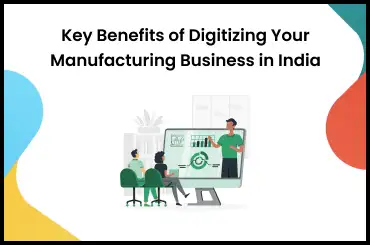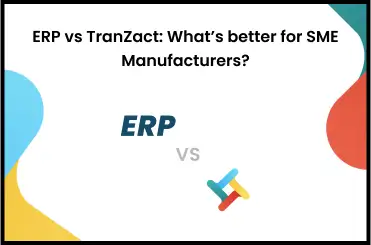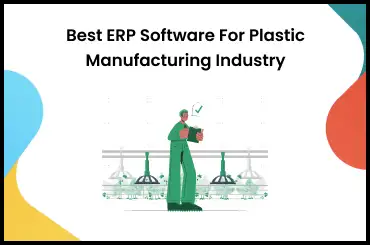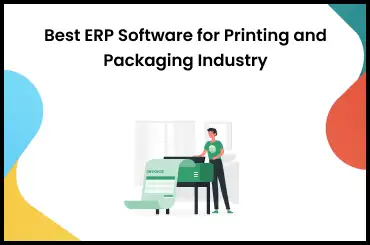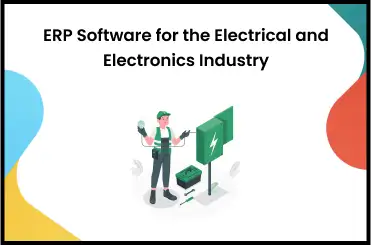There are multiple types of ERP systems based on their features focusing on enterprises, specific businesses, or industry requirements. An ERP system enables a business to conduct multiple processes simultaneously and in perfect coordination for business success.
To sustain, manage and progress a business or an industry, it is essential to integrate a seamless data management system where information can be tracked, fed, accessed, and verified seamlessly. Enterprise Resource Planning (ERP) system is an integrated software solution designed to manage and automate various business processes, such as finance, human resources (HR), supply chain, and operations.
Generally, ERP systems are programmed around a central, defined data structure, also referred to as schema, performing as a common database.
What Is an ERP System?
ERP or enterprise resource planning system is a software solution to help businesses manage and store information surrounding core business processes like inventory, accounting, risk management and compliance, manufacturing, HR, supply chain, and others. This integrated system incorporates a seamless flow of shared business data across departments and multiple business locations to ease data accessibility and transparency, infuse data integrity, and establish reliable business management.
There are different types of ERP systems based on the size of the business, its applications, and the needs of the organization. Besides, every ERP system is crafted with built-in modules; nowadays, there is an option for customizing client-required additional modules.
Read on to learn about the different types of ERP systems that offer dedicated support for industry-specific requirements.
Types of ERP Systems
ERP systems can be both generic and industry-specific. Moreover, ERP software programs are designed with various built-in modules to facilitate businesses in a general framework leveraging the following benefits.
- Effective automation of business processes
- Reduce manual labor
- Efficient workflow management
- No duplicity of data
However, to gear up the efficiency of your business, the right pick from the available types of ERP software matters a lot. Before you start looking for an ERP system, it is essential to know your requirements.
ERP software is becoming the central management base in most businesses nowadays. The global ERP market has grown immensely in the last few years. It was $43.72 billion in 2020 and is estimated to reach $117.09 billion by 2030 as per the Allied Market Research Report.
Types of ERP software based on service patterns are:
- On-premise ERP
- Cloud-based ERP
- Custom-built/ Hybrid solutions
Types of ERP systems as per functionality and features are:
- Generic
- Industry-specific
- ERP for small, midsize, or large companies
Let's find out more about each type.
On-premise ERPs
On-premises ERP software is directly installed on the company's hardware and servers. This type of ERP system offers comprehensive control of the software in the company's hardware. In this case, the software is installed in a desired data center as per client requirements.
However, the greatest challenges that come along with this type of ERP are the installation, operations, and maintenance of the hardware, as well as software, which is the responsibility of the company.
- The company acquires comprehensive control of the system and custom control of different modules as per requirement when it purchases an on-premise ERP system.
- The price of an on-premise ERP system differs based on the size, number of users and other factors.
- The company needs to make a one-time upfront payment for the license of an on-premise ERP software which is a potential investment.
- The financial liabilities may essentially increase with periodical updates every 5 to 10 years, with the need for hiring technology to support specialists, training, and other needs.
Cloud-based ERPs
A cloud-based ERP is a new-age ERP system that is designed to minimize the hassles of the client as it can be accessed over the internet from the vendor's server, where it is hosted. Therefore, cloud-based ERP software operates from remote servers located on the cloud, which would essentially be accessed online. Hence, there is no additional load on the company's server.
A cloud ERP provides end-to-end support on a system, patches, training, and updates as and when required by the client company. Besides, the provider conducts updates and training programs multiple times a year, minimizing the liability of expensive timely upgradation like on-premise ERPs. Other benefits include the following:
- A cloud-based system of ERP is comparatively cheaper than an on-premise system.
- Easy calculation of ERP system investment.
- Hassle-free availability of quarterly or annual subscriptions to cloud software.
- Subscriptions generally include fees for technical support, training, as well as updates.
- Affordable solution for start-ups and small businesses with a budget-friendly upfront price.
- Implementation of a cloud ERP system requires comparatively less time.
However, unlike on-premises ERP, cloud ERP offers limited control and customization abilities over the system, for which you will need to contact the vendor every time. Companies are often also cautious of data security, which is the vendor's responsibility.
However, to ensure strict data security, you need to select a reputed and reliable vendor for reliable and industry-standard data security design. You can also avail of a third-party security verification audit to ensure that your cloud ERP has essential data security standards.
Custom/Hybrid ERPs
As the name suggests, a hybrid model includes essential features or benefits from both types of ERPs i.e. on-premise and cloud. Hybrid ERPs are custom-designed solutions for companies that may require a new system or amendments to existing ERP software.
This type of ERP system can be easily customized as per the customer's requirements. It is easy to develop new modules and integrate them as custom features in software or an existing one. When you need a combination of on-premises software integrated with exclusive cloud features like services, storage, and remote access, you need to look for hybrid ERP providers.
Generic ERPs
Generic enterprise resource planning systems offer a spectrum of generalized features and functionalities integrated into the software, which can find easy applications across a multitude of small and mid-cap businesses and industries. Generic ERP systems have limitations in a wide range of operations; however, they offer efficient accounting tools to manage finances.
A generic ERP is ideally a good pick for new start-ups and small businesses that cannot essentially afford expensive custom industry-specific ERPs or on-premise dedicated software. Generic ERPs can comfortably offer functionality for businesses with general basic work approaches.
The most common modules found across generic ERP systems are:
- Customer relationship management (CRM)
- Human Resources
- Supply Chain Management
- Finance and Accounts management
- Analytics
- Manufacturing
- Inventory management
- Business Intelligence (BI)
- Planning and forecasting
Industry-specific ERPs
Industry-specific ERPs are meant to specifically support the requirements of specific industries like retail, garments, grocery, and similar sectors. They are also known as vertical ERPs across the ERP market and industries. Typically, these software systems are designed and developed to meet tailor-crafted industry requirements like waste removal management, distribution management, and warehouse management. Such modules can be specifically integrated according to industry requirements.
Therefore, their ERPs offer basic, specialized, and custom-made modules to meet specific industry requirements.
Industry-specific ERP systems come with the following functionalities:
- Exclusive features and modules as per industry
- Exclusive features to address common industrial issues
- Affordable costing
- Fast and relevant implementation
- Quick issue resolution
- Dedicated customer focus
ERPs for small, medium, and large businesses
Small businesses have comparatively less elaborate requirements or needs for specific operations like multinational companies. Therefore, the type of ERP systems they require is different from larger businesses. Besides even concerning financial and technical support, affording industry-specific, hybrid, or custom ERPs can be proficiently expensive. A cloud-based ERP is a perfect fit for small companies as it has all the basic features and costs less compared to other ERP types.
Midsize industrial enterprises generally do not consider investing in industry-specific ERPs which can burden their finances. Besides, even if they have a few custom requirements, they take up custom ERPs. One of the key benefits of incorporating types of ERP software with customization options is that you can ask for specific modifications over the general framework of ERP.
Large companies choose on-premise or hybrid ERP software with extensive modules to meet their complex business needs. Large companies also go for in-house ERP systems or Enterprise-level ERP systems to have a strong grip over their business spread across various locations.
Make the Right Choice of ERP Software
There are different types of ERP systems, and organizations have the leverage to pick the one that syncs with their organizational needs. Switching to the right type of ERP system reduces the probability of errors and makes the business operation more productive.
Therefore, when you plan to purchase ERP systems to improve and boost your business performance and ease operations, start by chalking down your requirements and priorities. Once you know your needs, check for vendors who have a good reputation in the market. Go through reviews, check the technologies used, and finally, make an informed decision.
TranZact is a centralized, cloud-based tool with expert ERP functionalities. It is being used by over 10,000+ Indian SMEs. Some of its key features are inventory tracking, automated production management , sales management, material requirements planning , and more.FAQs on Types of ERP Systems
1. What are the types of ERP modules?
ERP systems are integrated with a modular design which enhances and facilitates data processing and supports the different processes within a company to operate daily. Some basic modules of ERP software are as follows:
- Procurement
- Manufacturing
- Finance and Accounting
- Supply Chain Management
- Customer Relationship Management
- Inventory Management
- Human Capital Management
- Order Management
- Warehouse Management
- E-commerce
2. What is the most common type of ERP system?
There are different types of ERP systems available, but the most common one includes cloud ERP, on-premise ERP, and hybrid ERP.
3. What is manufacturing ERP software?
Manufacturing ERP specifically refers to dedicated Enterprise Resource Planning (ERP) software designed to manage manufacturing business operations like planning, management, and delivery of final products with specific modules and functionalities.








